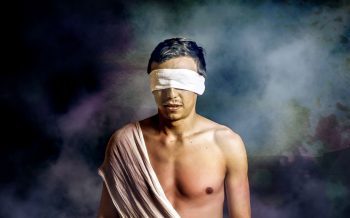By Mateo Sol
Guest writer for Wake Up World
Our “self-esteem” is a very delicate illusion. We are so off-centered when it comes to locating the origin of our self-worth, that the smallest realization of an imperfection in ourselves can bring up all kinds of insecurities.
When a person begins working with their soul, they will start through self-exploration to gain energy, vitality, and clarity. They will also, however, notice the ‘shock’ of beginning to see their own unconscious selves and their deep inner fragmentation (e.g: all your sub-personalities).
These contradictions within ourselves that speak of who we truly are beyond the social and cultural conditioning in our lives, are humbling, but more importantly, they can also be disturbing. If we were to discover and consciously become aware of all these contradictions at once, the shock would be so great we would most likely go insane.
Our brains have a limited capacity to process all the intellectual and sensory information that we encounter at any given moment, and because of this the unconscious mind exists. In essence, the unconscious mind is a psychological “buffer” which is a part of the brain that stores all the unprocessed information the conscious mind can’t handle.
The unconscious mind works as a shock-absorber, and in psychology this is known as a “defense mechanism”. There are an infinity of defense mechanisms going on within us at any given moment, but these are some of the most common I’ve observed in our practices:
Innocent Bystander
One of the greatest hindrances in anybody’s journey of self-growth is to fool themselves into thinking they haven’t done anything wrong. This may be why the recovering addict’s first step is to acknowledge they have a problem. Most people live in denial or avoidance of exploring themselves because it keeps them from properly recognizing their more unsavory traits and capacities.
“The world is screwed up but I’m completely guilt free” is their basic outlook on life. They refuse to see the interconnection between their actions and lifestyle with the external world around them.
Innocent Critic
This defense mechanism is very similar to the Innocent Bystander, only this one avoids guilt by actively criticizing the world and people around them. Criticizing is our way of rebelling against society and wanting to find a way out, of wanting to be outside of the ‘herd’ while still feeling a sense of false participation.
Critical thought is a necessary instrument in any persons self-growth. But often these “critics” use critical thinking as way of boosting their ego, to feel smarter than the ‘herd’ who haven’t realized what the critic has. Unfortunately, noticing what’s wrong with the state of affairs of the world isn’t enough unless you actively apply a solution to the problem. It’s the essential difference between the paths of self-discovery and self-understanding.
Suppression
Unquestionably, a major obstacle in living a fulfilling life to the maximum of your potential is your inability to be authentic to yourself (it’s the key element in Self-Love). All too often we live with an inner tension of controlling desires that we fear will be socially unacceptable. Let’s say you like a movie or a song that you know your friends don’t like, or maybe you are attracted to someone you know everyone will disapprove of, so you suppress that feeling.
The suppression won’t make the feeling go away, in fact, what happens is that you might be so good at suppressing the feelings that your unconscious mind learns to switch between your authentic self (“I like this person or thing”) to your false sub-personality (“I don’t like the person or thing anymore”).
In the end, the unconscious defense mechanism of “suppression” is protecting you from experiencing confusion as to whether you like something or not by jumping from one extreme to the other. Not only does suppression hinder your self-growth, but it can also contribute towards emotional, psychological and physical repression resulting in a host of sicknesses.
Repression
Repression differentiates from suppression in one important way. While suppression is initially a conscious process of having a desire and learning to avoid or ignore is, repression is an entirely unconscious process.
For example, you might have had a traumatizing experience as a child that unconsciously affected your feelings towards whatever the experience involved. This unconscious defense mechanism basically serves to protect you from feeling pain or other difficult emotions connected to the memories of what is being repressed.
Sometimes, religious beliefs or social conditioning can be so strong that desires that would normally be consciously suppressed (such as sexuality for instance), become automatically unconsciously repressed. You don’t even become aware of what exactly were the desires of your original authentic self, and this makes you completely out of touch with your true self. This self-denying defense mechanism makes it very difficult to learn and cultivate Self-Love.
Reactive Extremes
In psychology the technical term is “reactive formation”, and this is something you’ll observe everywhere. The nature of the unconscious mind is that it requires absolute certainties – it needs to see the world in black or white. There is no grey, or “in between”.
Many people who had a very strict religious upbringing for example, grow older and become disillusioned with the dogmatic ideas they’ve been taught. These people unconsciously find atheism a very attractive option, and become fanatical anti-God advocates, almost dogmatically. Another example of a reactive extreme is the person who finds it difficult to deal with, or understand, other people, and as a reaction decides to become a hermit and go live in the mountains.
Going to reactive extremes can also be illustrated in the case of sour grapes (or the false pretense that we don’t care for something we really do care for, which can be illustrated in the Fox and the Grapes fable). In this situation, our unconscious mind realizes that we are fixated on a certain topic so it protects us by going from one extreme to the other, e.g. from love to hatred.
Blameless Victim
I’m sure we’ve all come across an angry victim of life, someone who blames other people or the world for their difficulties. But everyone uses blame as a defense mechanism to some extent. In truth, what we’re defending ourselves from is our own responsibility for dealing with the unpleasant experience we’ve been given.
To indulge in blame is to give up personal responsibility and mentally delegate it to someone else, convincing ourselves that we are not responsible for the state of our lives, instead blaming it on some “outside force”. The blameless victim mechanism blocks us from seeing clearly just how we are contributing to our own suffering.
Essentially, the blameless victim is one of the fiercest protectors of our ego. It causes us to feel that we’re never failing ourselves, or that we lack the maturity or strength to come to terms with the reality of the situations we’re confronted with. Whatever happened is not evidence of our own inadequacy, but of someone else’s.
Have you observed any defense mechanisms in yourselves or in others? Let me know in the comments below!
Recommended articles by Mateo Sol:
- Spiritual Sex: 3 Types of Divine Union
- 6 Powerful Solfeggio Frequencies that Raise Your Vibration
- Hypnagogia: The Trippy Mental State That is the Key to Deep Self-Discovery
- 39 Self-Care Ideas for Those Who Struggle with Self-Love
- Signs and Omens: Listening to the Messages of Spirit
- 21 Signs You’re Experiencing “Soul Loss”
- Soul Retrieval Can Heal Addiction, Trauma and Mental Illness – Here’s How
- Mind, Self, Spirit and Soul: What’s the Difference?
- Why You Need to Forget Positivity, Keep Your Ego and Embrace Your Darkness
About the author:
Mateo Sol is a prominent psychospiritual teacher whose work has influenced the lives of thousands of people worldwide. Born into a family with a history of drug addiction, schizophrenia, and mental illness, Mateo Sol was taught about the plight of the human condition from a young age. As a spiritual guide and teacher, Sol’s mission is to help others experience freedom, wholeness, and peace in any stage of life. See more of his work at lonerwolf.com.
This article 6 Ways You Hinder Your Self-Growth Without Knowing It was originally published on lonerwolf.com.

If you've ever found value in our articles, we'd greatly appreciate your support by purchasing Mindful Meditation Techniques for Kids - A Practical Guide for Adults to Empower Kids with the Gift of Inner Peace and Resilience for Life.
In the spirit of mindfulness, we encourage you to choose the paperback version. Delve into its pages away from screen glare and notifications, allowing yourself to fully immerse in the transformative practices within. The physical book enriches the learning process and serves as a tangible commitment to mindfulness, easily shared among family and friends.
Over the past few years, Wake Up World has faced significant online censorship, impacting our financial ability to stay online. Instead of soliciting donations, we're exploring win-win solutions with our readers to remain financially viable. Moving into book publishing, we hope to secure ongoing funds to continue our mission. With over 8,500 articles published in the past 13 years, we are committed to keeping our content free and accessible to everyone, without resorting to a paywall.








